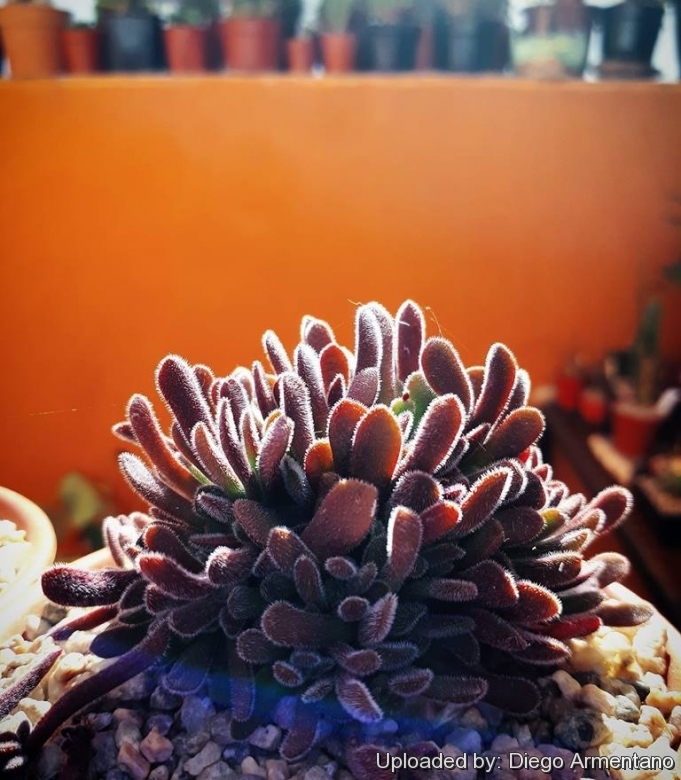Accepted Scientific Name: Crassula pubescens Thunb.
Nova Acta Phys.-Med. Acad. Caes. Leop.-Carol. Nat. Cur. 6: 330 1778

Globulea pubescens (Crassula pubescens) Photo by: Diego Armentano
Origin and Habitat: Western Cape. South Africa.
Habitat and ecology: Crassula pubescensSN|26776]]SN|26776]] ia a spring-flowering species that grows, among shrubs and under thin trees. Its foliage reddens in the dry, bright summer. .
Synonyms:
See all synonyms of Crassula pubescens
Common Names include:
ENGLISH: Jersey pigmyweed
Description: Crassula pubescensSN|26776]]SN|26776]] is a small semi-shrubby, perennial, succulent up to 30(-70) cm tall forming dense groups, with deciduous leaves. It has fragile stems and pubescent leaves. It is distinguished by its decumbent to erect habit without adventitious roots, a rounded inflorescence and petal appendages twice as long as broad and elongate-elliptic, the corolla cream to pale yellow. The pubescence varies much in different specimens in some the hairs are very short thinly scattered in others dense somewhat tomentose and even canescent. It blooms for months in winter and spring, with white fragrant flowers.
Roots: Fibrous.
Branches: Succulent, densely branched, green to reddish-green, becoming woody and grey-brown without adventitious roots.
Leaves: (6-)15-35(-40) mm long, 5-12(-20) mm wide, usually in basal rosettes, flattened, spreading, oblanceolate, obovate to oblong-oblanceolate or oblong-obovate, rarely eliptic or linear, obtuse to acute, variable pubescent to nearly glabrous, green to brown, upper face slightly convex, flat to channelled, lower face convex, margin acute, minutely ciliate, base cuneate, tips obtuse to acute.
Inflorescences: Erect spike-like thyrses, rounded to somewhat elongate with with 1 to several globular dichasia in the upper half (i.e. part-inflorescences are rarely produced from more than 2 nodes on central axis). Peduncle 1-15 mm long, puberulous to glabrous, with 1-3 pairs of bracts. Lower bracts 5 mm long, 4 mm wide, erect, triangular-ovate.
Flowers: Cream to pale yellow. Sepals fleshy, green, oblong, 1-1.5 mm long, oblong-triangular, obtuse to bluntly acute, hairy, puberulous to glabrous and with marginal cilia. Corolla tubular to cylindrical, white, lobes to 2-3 mm long, oblong-panduriform, fused for 0,3-0,5 mm at the base, with globose apical appendages and with short membranous petal apex on inside. Stamens with yellow anthers.
Subspecies, varieties, forms and cultivars of plants belonging to the Crassula pubescens group
 Crassula pubescens Thunb.: (subsp. pubescens) has erect habit without adventitious roots, a rounded inflorescence and petal appendages twice as long as broad, the corolla cream to pale yellow. Distribution: Western Cape.
Crassula pubescens Thunb.: (subsp. pubescens) has erect habit without adventitious roots, a rounded inflorescence and petal appendages twice as long as broad, the corolla cream to pale yellow. Distribution: Western Cape. Crassula pubescens subs. radicans (Haw.) Toelken: has glabrous leaves, delicate decumbent branches and spherical petal appendages. Distribution: Port Elizabeth and King William's Town.
Crassula pubescens subs. radicans (Haw.) Toelken: has glabrous leaves, delicate decumbent branches and spherical petal appendages. Distribution: Port Elizabeth and King William's Town.- Crassula pubescens subs. rattrayi (Schönland & Baker f.) Toelken: Is rosulate with short branches, no adventitious roots, leaves covered with short hairs and inflorescence often elongated. Distribution: Graaff-Reinet to Tarkastad in the Eastern Cape.
Bibliography: Major references and further lectures
1) Urs Eggli “Illustrated Handbook of Succulent Plants: Crassulaceae” Springer Berlin Heidelberg, 05/Nov/2012
2) Doreen Court “Succulent Flora of Southern Africa” CRC Press, 01/June/2000
3) J.P. Roux, “Flora of South Africa”, (2003)
4) William Henry Harvey, O. W. Sonder “Flora Capensis: Being a Systematic Description of the Plants of the Cape Colony, Caffraria, and Port Natal”, Volume 2, 1862
Cultivation and Propagation: Crassula pubescensSN|26776]]SN|26776]] could be used as a ground cover in mild climates.










